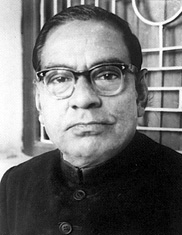
Back ابول مانسور اهميد ARZ আবুল মনসুর আহমেদ Bengali/Bangla Abul Mansur Ahmed Spanish ابو المنصور احمد Persian Abul Mansur Ahmed French Abul Mansur Ahmed ID ابو المنصور احمد Urdu
Abul Mansur Ahmad | |
|---|---|
আবুল মনসুর আহমদ | |
 | |
| Born | Ahmad Ali Farazi 3 September 1898 Mymensingh, Bengal Presidency, British India |
| Died | 18 March 1979 (aged 80) Dhaka, Bangladesh |
| Nationality | British Indian (1898–1947) Pakistani (1947–1971) Bangladeshi (1971–1979) |
| Alma mater | |
| Occupations |
|
| Spouse |
Akikunnesa (m. 1926) |
| Children | 4, including |
| Relatives |
|
| Awards | |
Abul Mansur Ahmad (Bengali: আবুল মনসুর আহমদ, pronounced [abul mɔnsuɾ aɦmɔd̪]; born Ahmad Ali Farazi, 3 September 1898 – 18 March 1979) was a Bangladeshi politician, writer, and journalist.
Ahmad began as an Indian National Congress worker in Bengal. He participated in the Khilafat Movement in his early youth. A strong advocate of peasant rights, disappointed by the Congress's negligence to Muslim peasants, like many other Muslim Congress workers of Bengal, he left the Congress and founded the Praja Samity (later the Krishak-Praja Samity), a peasant welfare organisation and its political arm the Krishak-Praja Party (KPP). He became a major organiser of the KPP in the greater Mymensingh district region. As the KPP president A K Fazlul Huq took office as the first prime minister of Bengal, after the 1937 provincial elections, Ahmad became one of his closest confidantes. Disheartened by KPP's failure in the government, he inclined towards the thriving Muslim League and the Pakistan Movement in the early 1940s. He realised that Pakistan is inevitable and urged the KPP workers to join the Muslim League, fearing a feudal elite and clergy domination in its leadership.
Ahmad was dismayed by the Muslim League government in East Pakistan. He joined the Awami Muslim League (later the Awami League), a dissident offshoot of the Muslim League. He proposed the Jukta Front coalition for the 1954 provincial elections and also authored its 21-points election manifesto. The Jukta Front won a landslide victory in the election and he was elected to the legislative assembly. He was a major critic of the Pakistan Constitution assembly debate in 1956. He served as the Minister of Commerce and Industry in the Suhrawardy cabinet of the central Government of Pakistan, also occasionally serving as the acting prime minister.
Ahmad was an author of stories, novels, and political satires. He also wrote extensively on politics, culture, and history. He argued that despite sharing the same Bengali language, Muslims of Bengal, primarily in East Bengal (often referred by him as 'Muslim Bengal'), had developed and cultivated a distinct Perso-Arabic-influenced Bengali Muslim culture in parallel to the Hindu culture cultivated by the Hindus of Bengal. In his writings, he used the East Bengal dialect of Bengali and the Perso-Arabic words used by the Muslims of Bengal, for which he suffered discrimination on occasions. He saw Pakistan as an opportunity for flourishing East Bengal's culture. As a member of the Pakistan Renaissance Society, he provided a vision for East Bengal's literary ideal.
As a journalist and politician, Ahmad observed and was involved in many crucial political events of Bengal and India at large. At different stages of his career, he was a confidante to many leading political figures of Bengal, including A K Fazlul Huq, Subhas Chandra Bose, and Huseyn Shaheed Suhrawardy. He was an important intermediary in many political arbitrations. His magnum opus Amar Dekha Rajneetir Panchash Bachhar (Fifty Years of Politics As I Saw It) (1969) is a first-hand chronicle and a critique of the politics of Bengal spanning his career.
He was awarded the Bangla Academy Literary Award in 1960 and the Independence Day Award in 1979 by the Government of Bangladesh.[1]
- ^ Mahfuz, Emran (17 March 2017). "Abul Mansur Ahmad: A Versatile Genius". The Daily Star. Retrieved 17 March 2017.
© MMXXIII Rich X Search. We shall prevail. All rights reserved. Rich X Search